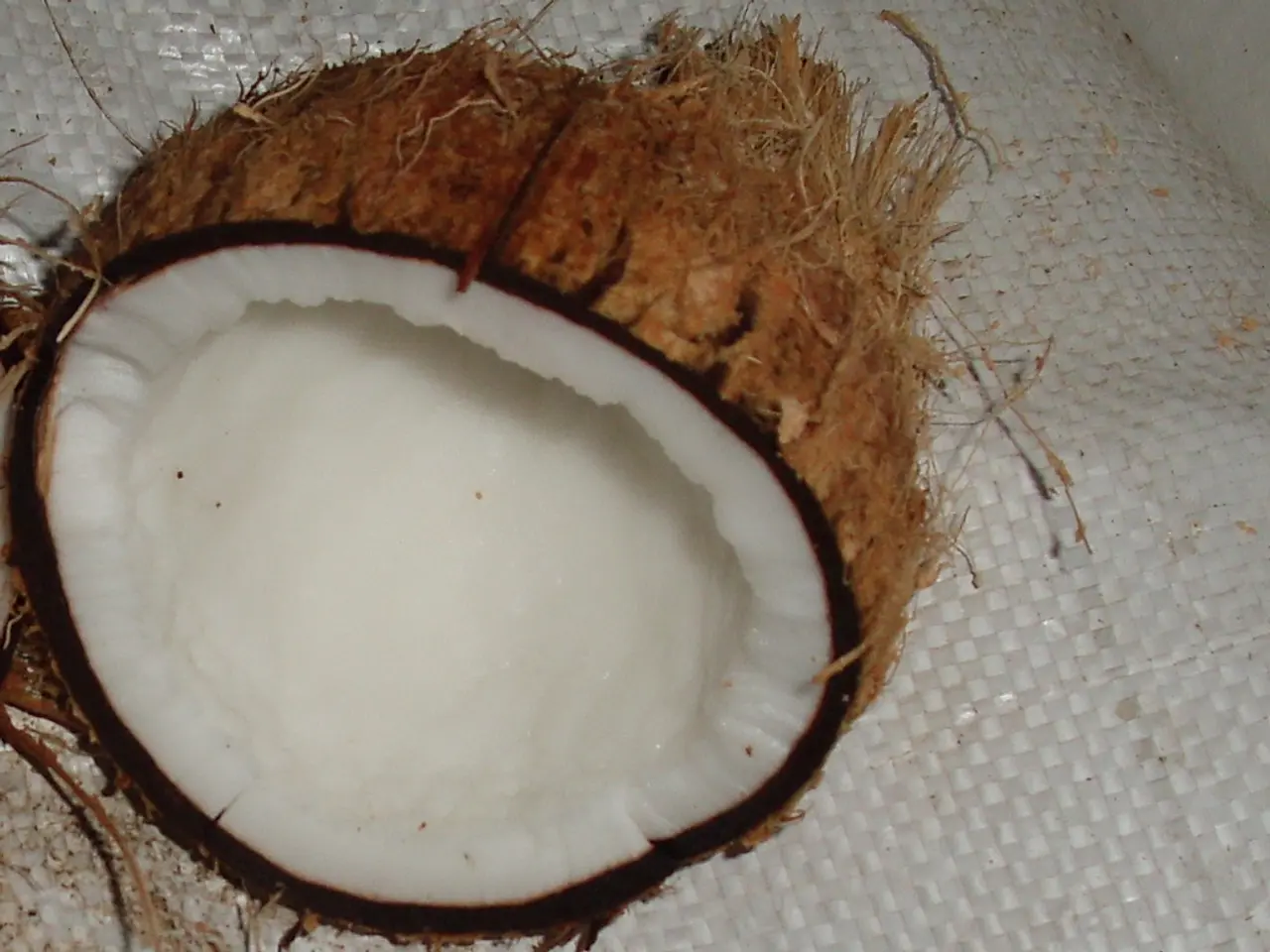Examination of Coconut Flesh: Nutritional Perks and Potential Hazards
Coconut meat, the white, fleshy inside of a coconut with a sweet taste, is a versatile food that can easily be added to a person's diet. It can be used in various ways, from blending it into smoothies to stirring it into curries, stews, or stir-fries.
However, while coconut meat offers several health benefits, it also comes with potential risks, particularly due to its high caloric and saturated fat content.
Coconut meat contains a significant amount of calories (283), protein (2.66 grams), carbs (12.2 grams), fat (26.8 grams), sugar (4.98 grams), fiber (7.2 grams), selenium (8.08 micrograms), copper (0.35 milligrams), phosphorus (90.4 milligrams), potassium (285 milligrams), iron (1.94 milligrams), zinc (0.88 milligrams), and manganese (1.2 milligrams). Much of the fat in coconut meat is saturated fat, but it is mostly made up of medium-chain triglycerides (MCTs).
For healthy individuals, moderate consumption of coconut meat is generally safe and can provide beneficial nutrients and fats. However, excessive consumption can pose several potential health risks.
One key risk is hyperkalemia, or high potassium levels, which can be dangerous for individuals with impaired kidney function. Excessive intake of coconut meat can lead to dangerously high potassium levels in the blood, causing muscle weakness, fatigue, irregular heartbeat, serious heart arrhythmias, or even cardiac arrest.
Another risk is weight gain and the increased risk of heart disease. Coconut meat is calorically dense and high in saturated fats. Excessive consumption can contribute to increased calorie intake, potentially leading to weight gain, which is a known risk factor for heart disease.
The saturated fats in coconut may also raise cholesterol levels, although some MCTs in coconut might have a more favorable effect. The overall effect in excess remains a concern, especially for those with heart disease or high cholesterol.
Additionally, coconut meat may interact with certain drugs, potentially exacerbating issues related to drug absorption. Research on this topic is limited, but it is something to consider for those who are taking medications.
For those aiming to decrease their fat intake, raw, young coconut may be a better option, as it has a lower fat content compared to mature coconuts.
It's important to note that coconut allergies can cause anaphylaxis, a severe and potentially life-threatening allergic reaction.
When preparing coconut meat, it can be done by piercing a hole in the top of the fruit, draining the water, lightly hammering the coconut to crack it open, and removing the meat with a spoon or knife.
In conclusion, while coconut meat offers numerous health benefits, it is essential to consume it in moderation to avoid potential health risks. Special caution is advised for people with kidney disease or cardiovascular issues. The United States Department of Agriculture recommends that saturated fat intake should not exceed less than 10% of a person's total daily calorie intake.
[1] National Kidney Foundation. (2021). Potassium and Kidney Disease. Retrieved from https://www.kidney.org/atoz/content/potassium [2] American Heart Association. (2021). Saturated Fat. Retrieved from https://www.heart.org/en/healthy-living/healthy-eating/eat-smart/fats/saturated-fat [4] Mayo Clinic. (2021). Coconut Oil: Health Benefits, Risks, and Uses. Retrieved from https://www.mayoclinic.org/healthy-lifestyle/nutrition-and-healthy-eating/in-depth/coconut-oil/art-20047091
- Coconut meat, a versatile food, can be incorporated into various health-and-wellness and fitness-and-exercise routines, such as blending it into smoothies for nutrition or stirring it into curries for food-and-drink recipes.
- Despite its nutritional benefits, consuming excessive amounts of coconut meat can lead to potential risks, especially for individuals with health issues like kidney disease, high cholesterol, or heart disease, due to its high caloric and saturated fat content.
- Healthy individuals can safely consume coconut meat in moderation, as it offers beneficial nutrients like electrolytes, such as selenium and potassium, and fats, mainly medium-chain triglycerides (MCTs).
- It is crucial to follow recommended dietary guidelines, such as limiting saturated fat intake to less than 10% of total daily calories as advised by the United States Department of Agriculture, to maintain a balanced lifestyle and avoid potential health risks associated with coconut meat consumption.




